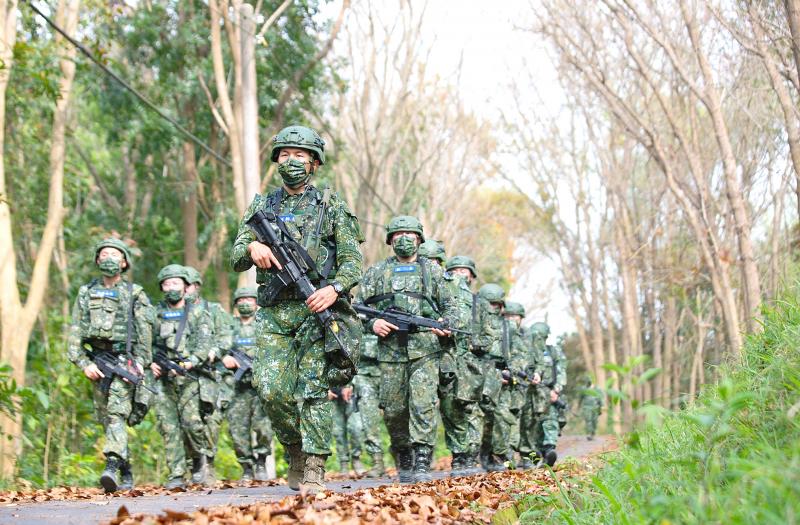Starting next year, the military is to double the number of special reservists it recruits annually as part of a reform project to create a more reliable backup force for regular troops, amid a growing military threat from China.
The Ministry of National Defense in a report to lawmakers last week said that it would recruit about 100 “weekend warriors” next year, compared with 49 expected to be trained this year.
The term “weekend warriors” refers to reservists who participate in the ministry’s short-term voluntary service program, under which they undergo training at military bases over weekends and on holidays.

Photo courtesy of the Eighth Field Army
The military is expected to set up new boot camps, reserve brigades and training centers in the coming years to beef up its reservist training capacity, as the military threat from China continues to escalate, the report said.
The project would include a larger contingent of “weekend warriors” who are familiar with regular troops’ operations and training, it said.
Previously, the ministry had said that Taiwan’s military could train only up to 120,000 reservists per year, although the number of eligible reservists in the nation was about 320,000.
However, the ministry in a report in 2020 said the military was working to establish five new boot camps and three reservist training centers in the coming years, which would increase its annual training capacity to 268,000 reservists.
The “weekend warrior” project was initiated in 2017 to recruit military retirees who still have good combat skills and expertise, the ministry said.

Authorities have detained three former Taiwan Semiconductor Manufacturing Co (TMSC, 台積電) employees on suspicion of compromising classified technology used in making 2-nanometer chips, the Taiwan High Prosecutors’ Office said yesterday. Prosecutors are holding a former TSMC engineer surnamed Chen (陳) and two recently sacked TSMC engineers, including one person surnamed Wu (吳) in detention with restricted communication, following an investigation launched on July 25, a statement said. The announcement came a day after Nikkei Asia reported on the technology theft in an exclusive story, saying TSMC had fired two workers for contravening data rules on advanced chipmaking technology. Two-nanometer wafers are the most

NEW GEAR: On top of the new Tien Kung IV air defense missiles, the military is expected to place orders for a new combat vehicle next year for delivery in 2028 Mass production of Tien Kung IV (Sky Bow IV) missiles is expected to start next year, with plans to order 122 pods, the Ministry of National Defense’s (MND) latest list of regulated military material showed. The document said that the armed forces would obtain 46 pods of the air defense missiles next year and 76 pods the year after that. The Tien Kung IV is designed to intercept cruise missiles and ballistic missiles to an altitude of 70km, compared with the 60km maximum altitude achieved by the Missile Segment Enhancement variant of PAC-3 systems. A defense source said yesterday that the number of

A bipartisan group of US representatives have introduced a draft US-Taiwan Defense Innovation Partnership bill, aimed at accelerating defense technology collaboration between Taiwan and the US in response to ongoing aggression by the Chinese Communist Party (CCP). The bill was introduced by US representatives Zach Nunn and Jill Tokuda, with US House Select Committee on the Chinese Communist Party Chairman John Moolenaar and US Representative Ashley Hinson joining as original cosponsors, a news release issued by Tokuda’s office on Thursday said. The draft bill “directs the US Department of Defense to work directly with Taiwan’s Ministry of National Defense through their respective

Tsunami waves were possible in three areas of Kamchatka in Russia’s Far East, the Russian Ministry for Emergency Services said yesterday after a magnitude 7.0 earthquake hit the nearby Kuril Islands. “The expected wave heights are low, but you must still move away from the shore,” the ministry said on the Telegram messaging app, after the latest seismic activity in the area. However, the Pacific Tsunami Warning System in Hawaii said there was no tsunami warning after the quake. The Russian tsunami alert was later canceled. Overnight, the Krasheninnikov volcano in Kamchatka erupted for the first time in 600 years, Russia’s RIA